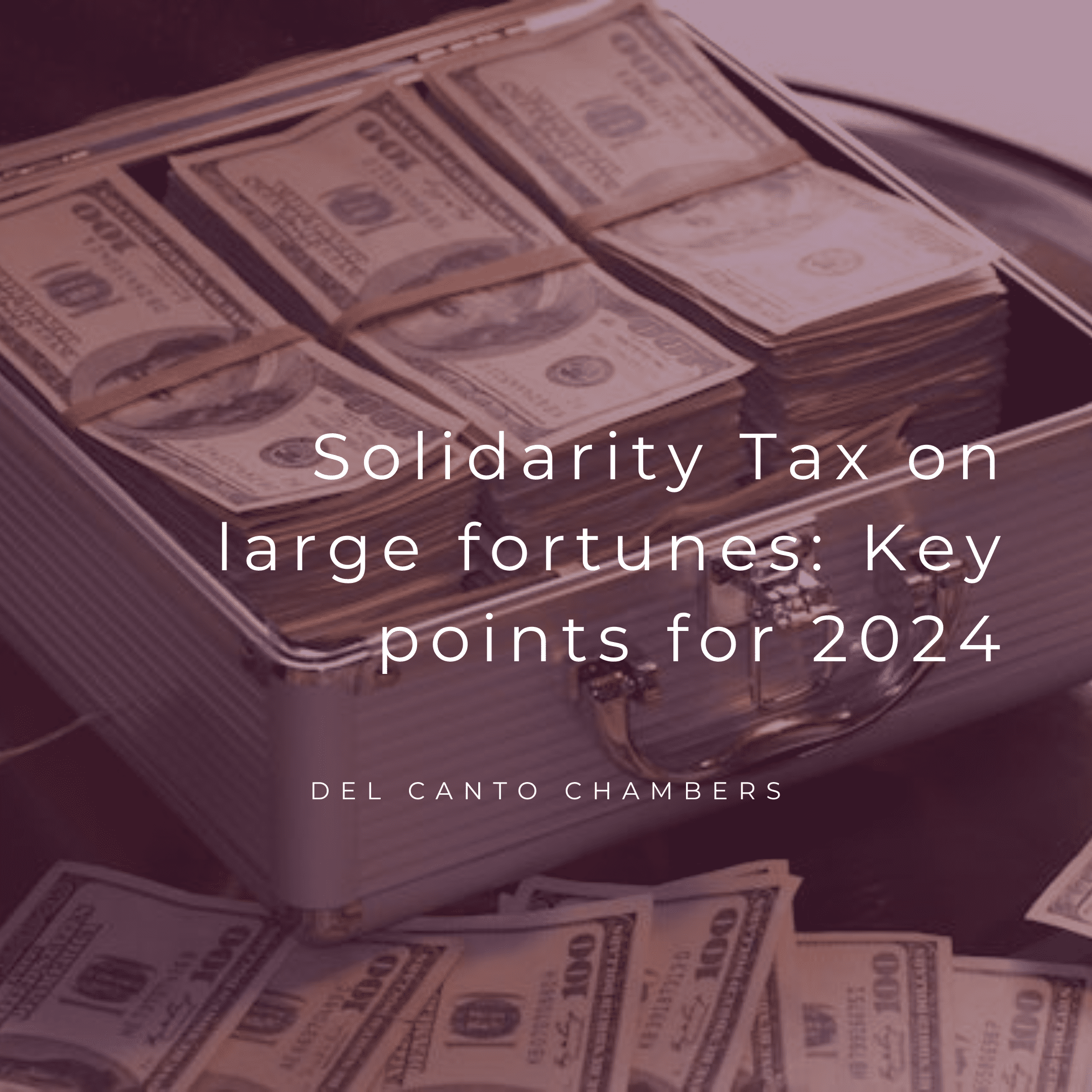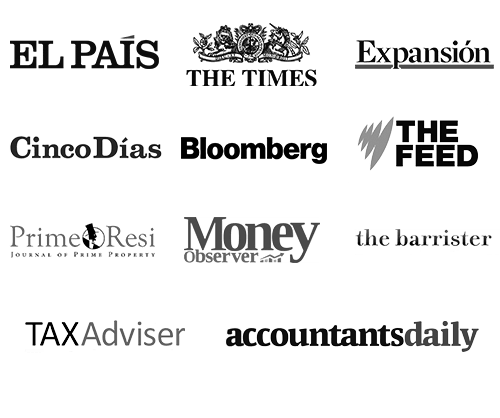Del Canto Chambers: fight against tax avoidance is key to restore confidence in tax system
Our Managing Partner, León Fernando del Canto, has published a piece in the journal Bloomberg BNA on the Joint International Taskforce on Shared Intelligence and Collaboration’s meeting (JITSIC) that took place in Paris
Del Canto considers that “narrowing the space of tax avoidance is the only way forward to successfully restoring public confidence in both the tax system and tax institutions”.
Taxpayers Audited in Largest Ever Simultaneous Exchange of Tax
León Fernando del Canto is Managing Partner at Del Canto Chambers
“The Joint International Taskforce on Shared Intelligence and Collaboration met in Paris in January 2017 to take part in the largest ever simultaneous exchange of tax information and to share results and details on thousands of investigations sparked by the Panama Papers. Having audited over 1700 taxpayers, a “target list” of 100 intermediaries has been identified, including lawyers, bankers and others who help wealthy individuals and companies set up and use tax havens, and will be further investigated.
- Background
Earlier in the month, on 16th and 17th January 16 and 17, 2017, tax agencies’ representatives, from 30 out of 36 of the Organization for Economic Cooperation and Development (“OECD”) countries, gathered in the French capital to address the global issue of tax avoidance. The voluntary and informal meeting was organised by the Joint International Taskforce on Shared Intelligence and Collaboration (“JITSIC”), which operates through a Single Point of Contact in each country. The main purpose of the meeting was to simultaneously exchange as much information as possible from more than 1,700 taxpayers and sift through the data in order to then put together a targeted list of 100 intermediaries which included lawyers, bankers and accountants. These intermediaries are deemed to have been helping wealthy individuals and companies set up as tax havens in various offshore jurisdictions. There were more than 2,550 requests for information that were made, with the countries present sharing their best practices and information based on legal instruments under the tax treaties and OECD. This sets the basis for helping to ensure that proper cooperation and collaboration is conducted on tax investigations.
- Ongoing Fight Against Tax Avoidance
When it comes to the ongoing fight against tax avoidance, the concept of a tax haven is more often than not what comes to people’s minds, especially given the year that we had in 2016. Breaking news in the press throughout last year included the likes of the “Panama Papers” scandal, which saw over 11 million leaked documents disclose financial and attorney-client information for more than 214,000 offshore entities. Further to this, there was the issue of the “Football Leaks”, in which Cristiano Ronaldo and José Mourinho were accused of having avoided paying tax on millions of dollars’ worth of their earnings by having channelled a large proportion of their money abroad.
To In my view, there are four main issues that need to be addressed when discussing plans to eradicate international tax avoidance, and we are at least seeing an increasing amount of evidence that the OECD is attempting to target one of the main issues, which relates to the central role that international tax advisers play in helping wealthy individuals to avoid paying higher tax rates.
- Lack of Clarity around Existing Professional Guidelines
The OECD has focused great energy in developing and implementing the Base Erosion and Profit Shifting (“BEPS”) project, where multinational companies shift their profits from jurisdictions that have high taxes over to ones that have either low or no tax at all. There are currently over 100 countries that are in collaboration with one another to implement BEPS measures, in order to ensure that tax avoidance strategies are in place so as to limit as much as possible the exploitation of gaps and mismatches in tax rules. What is really needed, however, is for the OECD to continue spending more time and energy focusing its efforts in policing the mechanism behind tax fraud. Until this issue is addressed, other efforts made are more or less in vain.
In this way, initiatives such as the JITSIC meeting in January thus becomes a fundamental piece of the jigsaw in helping to resolve this issue. This meeting used to include no more than a dozen countries and was rather unheard of to the wider world, however, Panama Papers has certainly played a big role in changing that. The idea behind setting up the comprehensive targeted list of professionals that are acting as enablers is with the aim of them being further investigated; tackling these enablers is fundamental to putting an end to the wrongdoing in the world of offshore finance. The JITSIC meeting that took place in Paris also serves to send a strong message to those ‘enablers’, reminding them that they need to be firmly abiding by the law; this is not only a matter of instilling public confidence in tax systems around the world— – it is even more so about restoring confidence in the rule of law, which enablers are undermining by using their professional status to their advantage. With the help of what was achieved at the JITSIC meeting, these enablers will, as of now, be looked into more thoroughly. Their role has been in the spotlight since the Panama Papers leak as providing the service needed of furthering their clients’ agendas.
One of the issues associated with successfully targeting tax evasion lies in the fact that there is simply a lack of clarity around existing professional guidelines, making it all the easier for the tax to be avoided, and the need for a global consensus is long overdue. These enablers are, from my point of view, one of the four main issues that the international tax avoidance problem can be put down to.
Initiatives which involve finding ways of dealing with the professionals acting as enablers and thus facilitating tax fraud are key to being able to efficiently tackle the problem. Intermediaries are essentially the structural nodes of the imaginary avoidance network. They are often found to be the responsible party for failing to abide by the financial rules that are in place. Instead of abiding by the rule of law, their practices are unfortunately too often being used for unlawful and unprofessional purposes.
The lack of global regulations that are in place across the international tax profession needs to be addressed. There is not an internationally agreed upon code of ethics and professional standards to regulate the international tax advisory profession worldwide. This means that, as a result, virtually any professional is able to provide international tax advisory services.
A.B. Lack of Interest in the Implementation of Universal Jurisdiction Principles to International Tax Evasion
The other three issues are, first of all, the lack of interest in the implementation of universal jurisdiction principles to international tax evasion, which does not allow for creating an efficient and effective jurisdictional environment for states to be able to prosecute tax evasion worldwide.
B.C. Legal meaning of “Tax Avoidance”
The second problem is that there is no agreement in place on an international scale detailing the legal meaning of “tax avoidance”, which effectively means a kind of “limbo” is created, which in reality is becoming a virtual ‘tax haven’ for tax evaders. It is also worth bearing in mind that tax evasion has a different meaning depending on the jurisdiction that you are in.
- Lack of Independence for Media Outlets
Thirdly, the increasing lack of independence that media outlets and investigative journalism have— – as a result of them being too concerned with maintaining profitability at any cost— – which inevitably leaves aside social responsibility as a result. A prime example of this was with the “‘Panama Papers”’ scandal, and the way that the media chose to report on it: celebrities’ names were used in order to help the story of tax avoidance gain traction, when in reality these stars didn’t necessarily have anything to do with trying to avoid tax.
The viral impact that ensued was based on all the celebrities that the media could find were “‘involved,”’, instead of reporting on the actual substance of the cases presented. For the majority of the public, celebrities’ reputations being at risk is more interesting to read about than the bigger issue of tax evasion and how it must be tackled. The reality is that many celebrities got no monetary advantages from offshore companies that they set up, but rather they have them for privacy reasons. The majority of leaked documents were, in fact, outdated and irrelevant from a legal point of view, and this was highlighted by the little legal impact that they actually had.
III. Conclusion
There is a lot of work to be done to fight tax evasion and it is not going to be possible to properly crack down on it and find a solution unless the above issues are addressed by the public and private sector at both a national and international level. It is very important that the States and tax professionals bear in mind that narrowing the space for tax avoidance is the only way forward to successfully restoring public confidence in both the tax system and tax institutions.
Not only does confidence need to be restored in these areas quite desperately, but as a wider issue, public confidence and reliance on the rule of law need to be restored. Taking these kinds of measures will assure JITSIC and other related meetings are worthwhile and may actually have a shot at tackling this global issue. Until then, these meetings are not going to achieve their ultimate goal of eliminating the worldwide problem of tax evasion”.
“León Fernando del Canto is Managing Partner at Del Canto Chambers”





